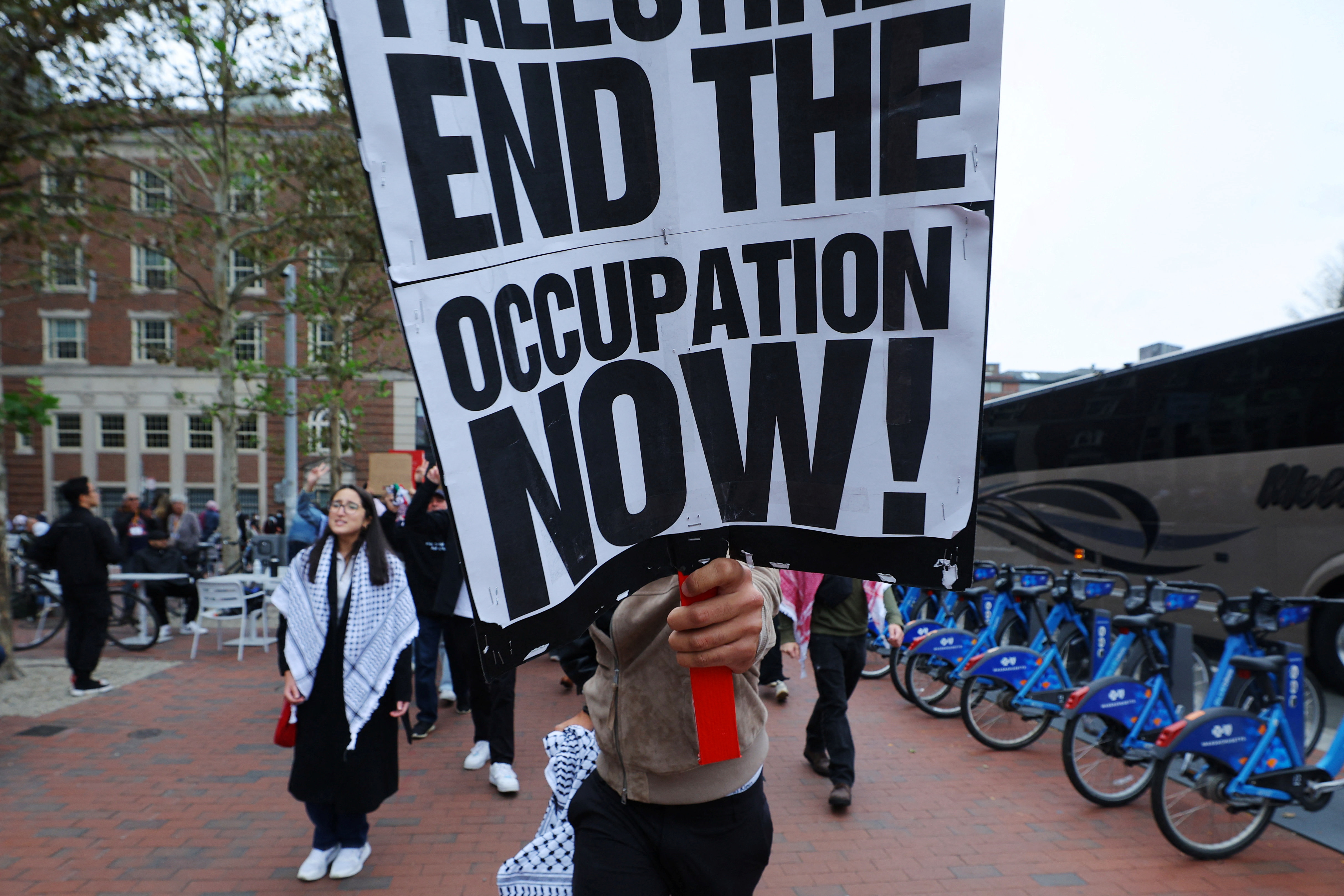Editor's Notes: Moral idiocy on campus

It is time for university administrators to consider where they went wrong – and adjust accordingly
It is difficult to know how best to describe the surge of moral idiocy that has flooded social networks, city streets, and college campuses since the Hamas massacre of October 7, but its prevalence among young people seems like a good place to start.A poll of American voters conducted by Harvard University’s Center for American Political Studies (CAPS) and The Harris Poll on October 19 – less than two weeks after the pogrom – found strong overall sympathy for Israel and support for its defensive measures against Hamas, but significant and deeply disturbing variation between age groups.While more than eight out of every ten respondents (86%) said that the Hamas massacre was a terror attack, that number plunged to 64% among respondents between the ages of 18 and 24, with more than a third – 36% – saying it wasn’t.
While more than eight in ten American voters (84%) said they side with Israel in the current conflict, that figure dropped to a stunning 52% among respondents between the ages of 18 and 24, with 48% saying they side with Hamas – a statistical tie.While three-quarters of respondents (76%) said the Hamas massacre cannot be justified by Palestinian grievances, 51% of those between the ages of 18 and 24 said they can.While 61% of voters said there is no moral equivalence between Hamas’s murderous terrorism and Israel’s actions, that figure plunged to 36% among respondents between the ages of 18 and 24, with roughly two thirds – 64% – saying Hamas and Israel have equally just causes.And while 62% of all respondents said the United States should stand with Israel in this conflict – compared to 31% who said the US shouldn’t get involved and only 8% said it should back Hamas – a plurality of those between the ages of 18 and 24 (41%) said they US shouldn’t get involved, with the majority split fairly evenly between those who said America should support Israel (30%) and those who said it should side with Hamas (29%).It’s important to note that the questions weren’t phrased – as they often are in polls of this sort – as pitching Israel against the Palestinians. While public opinion polls tend to show that Americans sympathize with Israel more than they do with the Palestinians, it would be understandable if sympathy with the Palestinians were somewhat higher than usual at a time when there is an acute humanitarian crisis developing in Gaza.But, no – the poll was explicit in pitching Israel, a liberal democracy acting in defense of its citizens, against Hamas, a genocidal terrorist organization that has just carried out the greatest mass murder of Jews since the Holocaust.And college-age Americans are clear: they see the two as being morally equivalent.They are also seemingly impervious to facts.Asked if they think the explosion at Gaza’s Al-Ahli Hospital was caused by an Israeli airstrike or a misfired Palestinian rocket, 45% of respondents between the ages of 18 and 24 said an airstrike and 55% a rocket. But when told that both US and Israeli intelligence agencies have said and shown evidence that it was a Palestinian rocket, the figures magically reversed, with 61% now saying that it was an Israeli airstrike and only 39% a Palestinian rocket. Contrary to any logical thought process, the evidence made them less likely to believe what it proved to be true.It should perhaps come as little surprise that, when asked whether it’s true that Hamas terrorists “killed 1,200 Israeli civilians by shooting them, raping, and beheading people, including whole families, kids, and babies” – all of which was gruesomely and exhaustively documented, including by the perpetrators themselves – only 68% of college-age respondents said it is. A third – 32% – said it’s fake news.It would be one thing if these abhorrent attitudes and distortions of logic and morality were restricted to these young people’s minds. But, of course, they have not been.In the weeks since October 7, American college campuses have been awash with pro-Hamas propaganda and demonstrations.In one high-profile case, dozens of student groups at Harvard released a joint statement blaming Israel for the mass murder of its own citizens.“We, the undersigned student organizations, hold the Israeli regime entirely responsible for all unfolding violence,” they wrote. “Today’s events did not occur in a vacuum… In the coming days, Palestinians will be forced to bear the full brunt of Israel’s violence. The apartheid regime is the only one to blame.”In another incident that went viral just this past Wednesday, visibly Jewish students at New York’s prestigious Cooper Union were trapped in the school’s library as pro-Hamas students chanted violent slogans and pounded on the doors.New York City Council member Inna Vernikov wrote on X (the platform formerly known as Twitter) that she spoke to four of the Jewish students the next day.“Even though this rally/walk-out was supposed to be outside the school on public property, protestors stormed the school building,” she wrote. “There were no consequences and nobody was arrested.”According to the students, faculty members not only canceled class in order to enable students to participate in the event and offered extra credit to those who did – many of them participated themselves.“The Jewish students barricaded in the library were terrified, some of them shaken,” Vernikov wrote. “They believed they could’ve been physically assaulted and injured, and feared for their well-being.”The Cooper Union is hardly the exception. Faculty members have been complicit in creating hostile environments for Jewish and pro-Israel students on campuses across America.Instructors at numerous universities have canceled class and offered extra credit in order to encourage student participation in various anti-Israel rallies and events and some have spoken out in favor of Hamas and its acts of mass murder.At Cornell University, one professor was caught on camera lauding the Hamas massacre during an anti-Israel campus rally.“Hamas has shifted the balance of power, Hamas has punctured the illusion of invincibility. That’s what they’ve done,” said Russell Rickford, an associate professor of history at the school. “It was exhilarating. It was energizing.”The University of California Ethnic Studies Faculty Council, representing hundreds of faculty members throughout the UC system, wrote to the system’s president and board of regents and demanded that they retract their statement condemning the Hamas atrocities.“The charges of ‘terrorism’ and ‘unprovoked’ aggression have contributed to a climate that has made Palestinian students and community members unsafe, even in their own homes,” they wrote.When faculty members themselves encourage and even participate in efforts to extol a recognized terrorist group and condemn a democracy for defending its citizens, is it any surprise that their students are doing the same?Happily, some of the universities’ most prominent supporters are starting to fight back.As we at the Post highlighted in our editorial on Tuesday of this week, Jewish donors are informing administrators that they will be halting their contributions so long as anti-Israel and antisemitic campus activity goes unaddressed.“The reality in which a Jewish donor may give heavily to an institution in which his or her grandchild might feel uncomfortable due to his or her Jewish identity or connection to Israel is one that has vexed many in the Jewish community for years,” we wrote. “Now, it appears, the tide may finally be turning.”Among the growing list of individuals who have informed their alma maters and the beneficiaries of their longtime support that they are stopping their giving are Leslie and Abigail Wexner, Marc Rowan, and former Utah Governor Jon Huntsman Jr. (who isn’t Jewish).“For many Jews, it seems, this is a watershed moment,” we at the Post wrote. “For far too long, universities have enjoyed the beneficence of Jewish donors while doing little to ensure that Jewish students experience academic environments free of hate and intimidation.”“Directly or indirectly, Jewish donors have been paying the salaries of professors who bully Jewish students, funding student groups that engage in anti-Zionist antisemitism, and subsidizing events in which the Jewish state and its supporters are demonized. Not anymore.”This is an important step in the right direction, but it isn’t enough.It shouldn’t take threats from donors for university leaders to do what they must to ensure their campuses are safe for Jewish students – and free of support for terrorism.
A moral and an education failure
On an immediate, practical level, administrators should work with authorities to ensure students, faculty, and anyone else expressing support for a recognized terrorist group and engaging in incitement to violence is identified and held accountable. Just take a look at TikTok – they aren’t shy about broadcasting their noxious views and ugly activities.But university leaders should also pause for a moment and look inward. Universities don’t exist merely to impart knowledge, but also to engage in moral instruction. To be sure, college students are bombarded with information from an unprecedentedly large array of sources, but so long as they are on campus, universities should take seriously their responsibility to ensure that they graduate not only better-educated but better people. A student who views Israel and Hamas as being on equal moral footing – or who supports or justifies acts of unspeakable violence against innocent men, women, and children – represents both a moral and an educational failure.As they observe the events unfolding on campus and review the polling data, it is time for university administrators to consider where they went wrong – and adjust accordingly
Jerusalem Post Store
`; document.getElementById("linkPremium").innerHTML = cont; var divWithLink = document.getElementById("premium-link"); if (divWithLink !== null && divWithLink !== 'undefined') { divWithLink.style.border = "solid 1px #cb0f3e"; divWithLink.style.textAlign = "center"; divWithLink.style.marginBottom = "15px"; divWithLink.style.marginTop = "15px"; divWithLink.style.width = "100%"; divWithLink.style.backgroundColor = "#122952"; divWithLink.style.color = "#ffffff"; divWithLink.style.lineHeight = "1.5"; } } (function (v, i) { });

